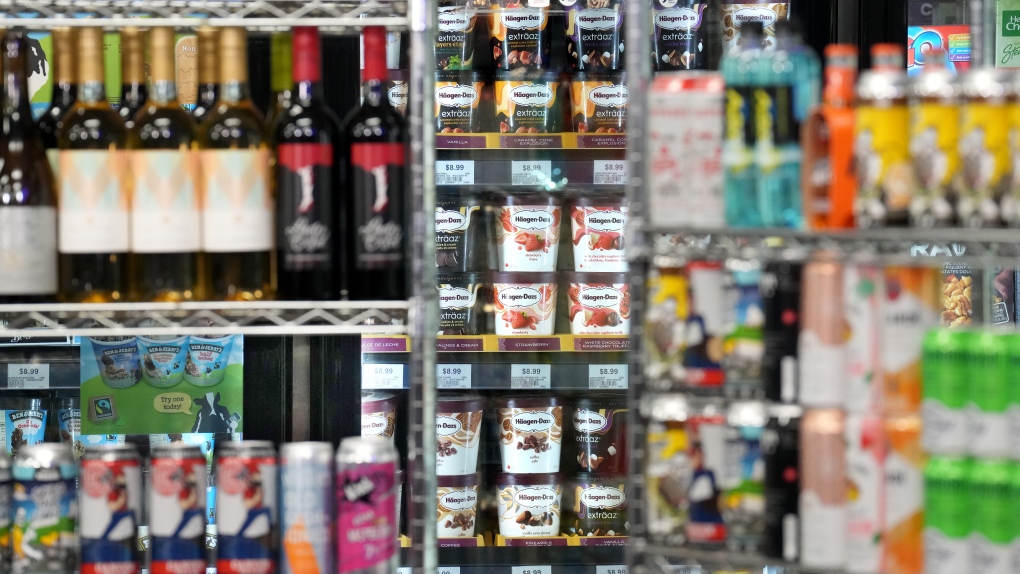Ontario will not raise drinking age or stop selling alcohol in convenience stores, despite health concerns
Ontario Premier Doug Ford says he will not consider raising the drinking age or reducing the number of stores that sell alcohol amid health-related concerns made by the province’s top doctor.
“We believe in treating people like adults,” he said at a news conference in Vaughan, Ont. on Wednesday.
“You get to go into a retail store, a big box store, and buy a bottle of wine with your steak and maybe a six pack of beer like the rest of the world. That’s what we believe in.”
In his annual report, Chief Medical Officer of Health Dr. Kieran Moore recommended the province adopt a “comprehensive alcohol strategy designed to reduce alcohol-related harms.”
Part of that strategy included monitoring the impact of the minimum legal drinking age on the health of Ontario residents, specifically in terms of “youth morbidity and mortality.”
“Alcohol is the most widely used substance in Ontario,” the report says, noting that alcohol consumption was also significantly higher during the pandemic.
“Alcohol is a leading cause of preventable death in Ontario and a significant cause of serious health harms. In an average year in Ontario, about 4,330 (4.3 per cent) deaths, 22,009 (2.1 per cent) hospitalizations, and 195,693 (3.7 per cent) of emergency department visits among people aged 15 and older can be attributed to alcohol use.”
Health Canada adopted new guidelines last year that focuses on the key message that “less is better.”
Moore also suggested the province should launch a “wide-reaching evidence-informed” education campaign to improve public awareness of the health risks associated with alcohol use while working with the federal government to require warning labels or signage that displays those risks publicly.
The Ontario government has said it will not be exploring any of the recommendations in the report.
“I’ll always support Dr. Moore in the job he’s doing. Do we disagree? Yes, we disagree,” Ford said, adding that if an individual who is 19 can be enrolled in the military, they should “be allowed to have a beer.”
 People are seen with pints of beer in this stock photo. (Pexels)
People are seen with pints of beer in this stock photo. (Pexels)
Dr. Dominique Morisano, clinical psychologist and adjunct professor at the University of Toronto and University of Ottawa, told CTV News Toronto that raising the legal drinking age would likely reduce alcohol-related deaths in the province.
“But it would be best practice to do these things in conjunction with other changes.”
The Centre for Addiction and Mental Health (CAMH) suggested in 2019 that raising the minimum legal drinking age would reduce alcohol-related harm. However, the report also said this would be “politically difficult.”
Instead, it suggested the province focus on enforcement for both purchase and advertising of alcohol products.
Morisano said she agrees with Moore’s “all-of-society approach” to addressing substance use and harms, and argues that Ontario needs to address issues such as housing and access to food and water.
“If we were to raise the age of legal drinking, if we were to reduce the number of stores that are available to purchase alcohol … … you’re going to reduce drinking, you’re going to reduce alcohol related harm.”
Should Ontario be selling alcohol in gas stations?
Ontario has 2.1 alcohol retail outlets per 10,000 population, the report notes, in part due to an expansion of sales to grocery stores in 2015.
The Canadian Alcohol Policy Evaluation (CAPE) Project, funded by Health Canada and the Public Health Agency of Canada, suggests a maximum retail density of two per 10,000
“The expansion of alcohol sales in Ontario in 2015 was associated with a 17.8 per cent increase in emergency department visits attributable to alcohol, which was more than twice the rate of increase for all emergency department visits over this period,” the report notes.
 Beer cans are stacked as props in front a display of ice cream, at a press availability attended by Ontario Premier Doug Ford at a convenience store in Toronto, Thursday, Dec. 14, 2023. The Ontario Government announced that in 2026 they will allow sales of beer, wine, cider, coolers and pre-mixed drinks to be sold at convenience stores, grocery stores and “big box” retailers. THE CANADIAN PRESS/Chris Young
Beer cans are stacked as props in front a display of ice cream, at a press availability attended by Ontario Premier Doug Ford at a convenience store in Toronto, Thursday, Dec. 14, 2023. The Ontario Government announced that in 2026 they will allow sales of beer, wine, cider, coolers and pre-mixed drinks to be sold at convenience stores, grocery stores and “big box” retailers. THE CANADIAN PRESS/Chris Young
Moore writes that if the number of retail outlets selling alcohol increases, the province will need to invest in services to monitor compliance with minimum age laws as well as product promotion. The government will also need to “consider other measures to reduce potential harms, such as fines and license fees, progressive enforcement up to and including loss of license, and enforcing restrictions related to the distance/ proximity of these outlets to places like schools and daycares.”
In December of 2023, Premier Doug Ford announced that 8,500 new stores will be allowed to sell alcohol by 2026. This means that beer, wine, cider, coolers, seltzers and “other low-alcohol ready-to-drink beverages” will be available for purchase in some convenience stores, including those located at gas stations.
“It’s going the opposite direction, more places, longer hours, open more days,” Morisano said.
When the expansion was first announced, CAMH said they were “deeply concerned” at how the government was putting convenience ahead of the health of Ontarians.
“Evidence shows that the expansion of alcohol availability, especially through private retail outlets, results in increased consumption and ultimately more alcohol-attributable hospitalizations, diseases, and deaths,” officials wrote.
“We’ve seen these harms play out in Ontario and elsewhere in Canada.
The government, meanwhile, is not changing their mind. Ontario Health Minister Sylvia Jones said Wednesday they have made investments in youth wellness and new treatment facilities.
“We’ll continue to do that,” she said. “But I think at the end of the day, we have to let Ontarians be adults, just as we see in other Canadian jurisdictions.”
View original article here Source









